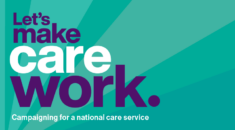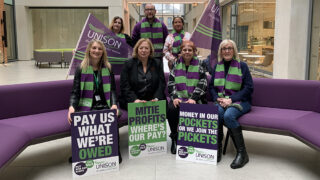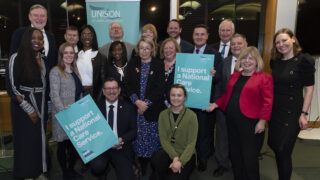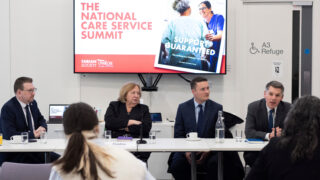Before becoming an MP, Angela Rayner was a care worker and UNISON rep. One of the reasons she stood to become an MP was to help make sure that care workers were treated better.
Speaking to 12 care workers on an online call this week, she introduced herself as Angie, saying “I’m one of you guys.
“There’s no better way of understanding what’s been happening than by listening to care workers themselves.”
With the promise of anonymity, the carers on the call spoke frankly about their unsafe working conditions, low pay and the personal protective equipment (PPE) challenges thrown up by COVID-19.
As one carer working for a private care provider said: “I used to love my job, but it’s all changed with COVID-19.
“Our regular clients have been taken off us and we’re taking people directly from hospital who are COVID-19 positive or suspected to be.
“We’re given a flimsy plastic apron, a fluid-resistant surgical mask – which we had to fight for – and a pair of goggles.
“We’ve been told the virus doesn’t move on clothing, but I’m seeing 11-13 clients a day, going from house to house. Everyone’s frightened to go to work.”
Another carer, who works for a local authority, stated: “For PPE, you have to wear the same mask all day for all calls. That’s just a disposable mask you’re not meant to wear for more than one call.
“I can see 20 clients in a day. We’re told to change our gloves and apron, but keep the same mask on.”
Ms Rayner responded: “I used to do home care, and when you have a cough or cold, you can’t go into work – it feels like you’re going to kill your service user.
“It’s not just about bringing it home to your family, but being terrified you’re going from one door to the next and infecting your service users. To know you’re in that position is heart breaking.”
Low wages for ‘unskilled work’
A key point of the discussion was how carers are devalued by the government as ‘unskilled’ and paid low wages.
One carer described it as “unacceptable that carers and support workers are being paid minimum wage.
“That’s why I’ve come here today. We do the fundamental parts of so many jobs: we’re cleaners, we’re nurses, we’re psychologists and we have to get specimens for doctors.
“We’re exposed to all the signs of the coronavirus and we’re not even given the adequate facilities or PPE to look after ourselves. The fact that most carers are paid minimum wage is deplorable.”
Another added: “If you’re 35 years old, the minimum wage is £8.72 an hour. It’s really hard, and you’re having to do long hours, sometimes without breaks.
“I find it really hard to cope, even when you have a family. We regard the people we work with as family as well and we have a duty of care to look after them. We should be paid twice the minimum wage.
“It’s so sad that it was voted down in the House of Commons that carers should have a pay rise. Most of us can’t afford to be off work during COVID-19 because we can’t afford to live off statutory sick pay.”
A domiciliary care worker shared her experience: “I have to pay my own petrol money. When you take that off the minimum wage, you aren’t even receiving the minimum wage.”
There was widespread anger at the recent government declaration that care work is ‘unskilled’. One of those taking part in the discussion declared: “Care workers need to be regarded for what they do – and not just through clapping.
“They’ve recently increased the amount of education you need to obtain a care certificate and be considered as a carer, but they don’t give too much of an increase once you get that.”
And she continued: “It’s a good thing that the Labour leader argued that NHS workers should not pay the health surcharge and should be regarded as highly-skilled workers.
“Recently, when I was coming home from work, my car broke down, and the delivery driver who drove me home asked me what I’m doing. When I told him, he told me that it’s too much work for peanuts money.
“So many people might want to do the job, but aren’t attracted to it because of the pay rates.”
And she added a salutary note: “80% of the population, at one point or another, will find themselves being looked after by a care worker.”
Another of those taking part has been in social care for 36 years and is a residential care worker.
“I work in a care home and we’ve got staff leaving because of having to work in conditions where there aren’t enough staff to give residents the care they’re paying for.
“We came into this job to care, but you find yourself having to rush past residents saying ‘I’ll come back in a minute!’ because you haven’t got enough staff to do the caring work to be done.
“We’re so undervalued and these residents’ lives are at risk. It’s someone’s grandma, mum or dad. Care is care and if you’re going to do it, do it properly.”
Ms Rayner attributed the devaluation of carers to economic ideology.
“Privatisation has fragmented the care sector. Ten years ago, UNISON and GMB brought in a career structure on the back of the NVQ level 2, to recognise the skills that care workers had.
“But this has been undermined by the fragmentation of the system. Now, private providers are delivering care packages at rates they can’t afford, and some are handing them back to local authorities because the council aren’t putting enough money into it and can’t run the service.”
Furlough and COVID-19
A care worker who is also a UNISON branch secretary said: “We’re seeing big issues around furlough and childcare. The furlough scheme is not being used for people who need childcare, and they’re being told to use annual leave.
“I work in the same service as my daughter is the single parent of two children aged 10 and 14, and she’s got a mortgage to pay. This week, she’s working 60 hours and I’m working 70 hours, while trying to organise the care of the children.
“We can’t rely on our usual support networks, and school provision that’s in place is totally inappropriate for care workers who work 12 or 24-hour shifts.”
“We’re sharing the care of the boys, and we’re grateful, but seven miles down the road is my 98-year old father and I haven’t seen him for months. It’s really, really difficult.”
There was cynicism among the group about #ClapforCarers, and concern that, once COVID-19 is over, carers will be forgotten once more.
“Carers who are looking after people who need help should be taken care of themselves,” said one. And they continued: “Carers have to work so many hours and, at the end of the day, they still struggle to keep a roof over their heads.
“There were issues in care before COVID-19, but now we’re at the centre of the public attention and there’s more sympathy.”
She suggested that once the pandemic is over “we’ll go back to being unskilled, invisible and on rubbish pay. The highest qualification you can get is an NVQ, which is pretty much just writing what you do every day. You’re not really learning anything to pass.
“How can we get carers to be skilled, something that you can get UCAS points for? Anything that stops carers staying at the bottom, where nobody has any respect for them.”
Another carer observed: “The clapping on a Thursday really irritates me. I see people clapping, then they all mix down the shop and on the beach. I’m saying: ‘don’t clap – support us at the end of all this when I hope the unions are going to campaign for us to get a decent wage.’
“Optimistically, people are realising how much we do and how much society relies on this. But the cynical part of me says that people won’t care and we’ll go back to being the lowest of the low.”
Responding to fears that carers would be forgotten, Ms Rayner told them: “One of the reasons I went into Parliament was for the domiciliary care sector and to make sure people were treated better.
“I remember UNISON and GMB were bringing in a career structure, and we’d gotten away from caring being seen as part-time women’s work. But in just over 10 years, it’s all been decimated by austerity.
“We’re collecting information and working with UNISON and yourselves to make sure that it happens. When I was a home carer and union rep, we were considered low-paid and at the bottom rungs of the NJC (the national pay grade for council workers), but it’s got so much worse since then.
“There’s no national framework or minimum for identifying skills. Care has changed. People think you just go round and make someone dinner, but it’s not like that at all.
“It’s really complex care needs that community carers are handling. It’s a very skilled job. Care workers are predominantly female, with a huge proportion of black and minority ethnic people in the sector.”
Ms Rayner identified the COVID-19 crisis as an opportunity for lifting the profile of carers.
“While people have realised care workers are here, we need to seize this moment. While everyone’s looking at what’s going on in your sector at the moment, let’s do something about it.
“We won’t miss this moment to make sure you’re valued. That you have fair pay for the work you do. That we recognise the skills for the work you do.
“We recognise you putting your life on the line for us.”
UNISON national officer Gavin Edwards said: “Listening to UNISON care members report on the situations they have been forced to deal with is very moving.
“The pandemic has brought the serious problems with social care into stark relief. Our care workers and the people they care for should never have been exposed in this way, through lack of PPE, a testing regime that isn’t fit for purpose and financial penalties for care workers who are following public health advice.
“UNISON has made it clear this is totally unacceptable.
“It has happened because, for far too long, care has not been given the priority which an essential public service needs. UNISON is now calling for a complete overhaul in the system, including proper funding, fair pay and an end to profiteering.”






